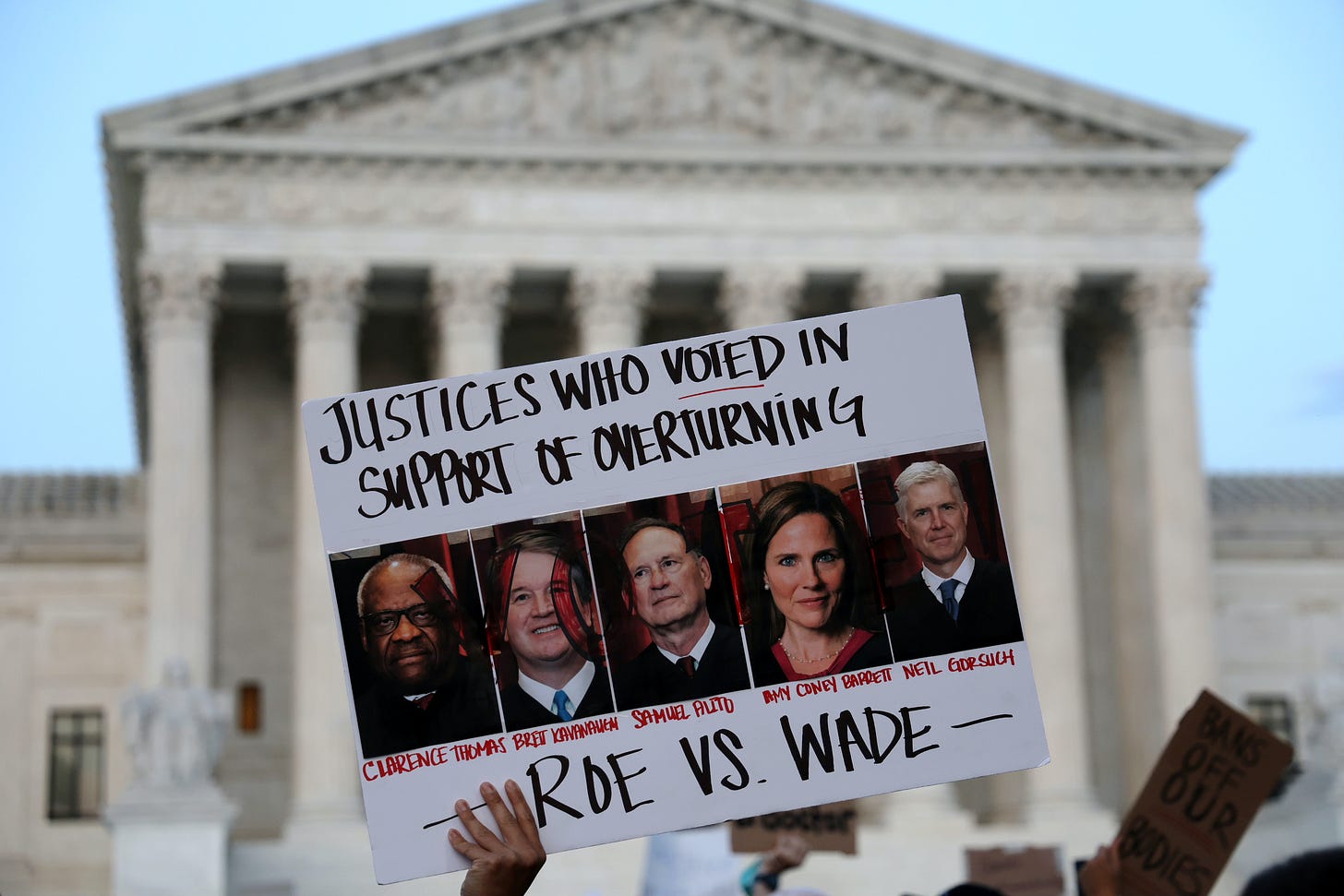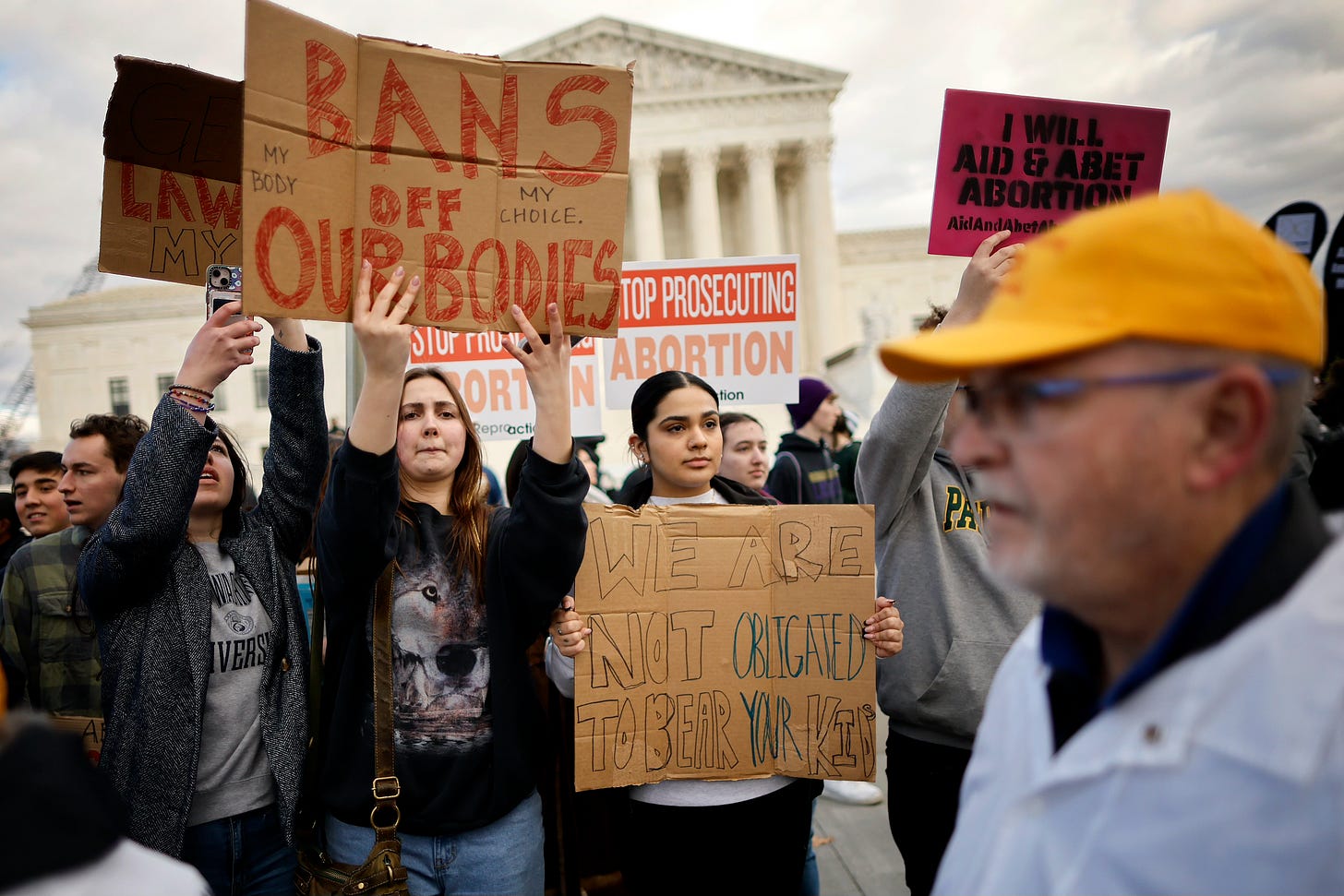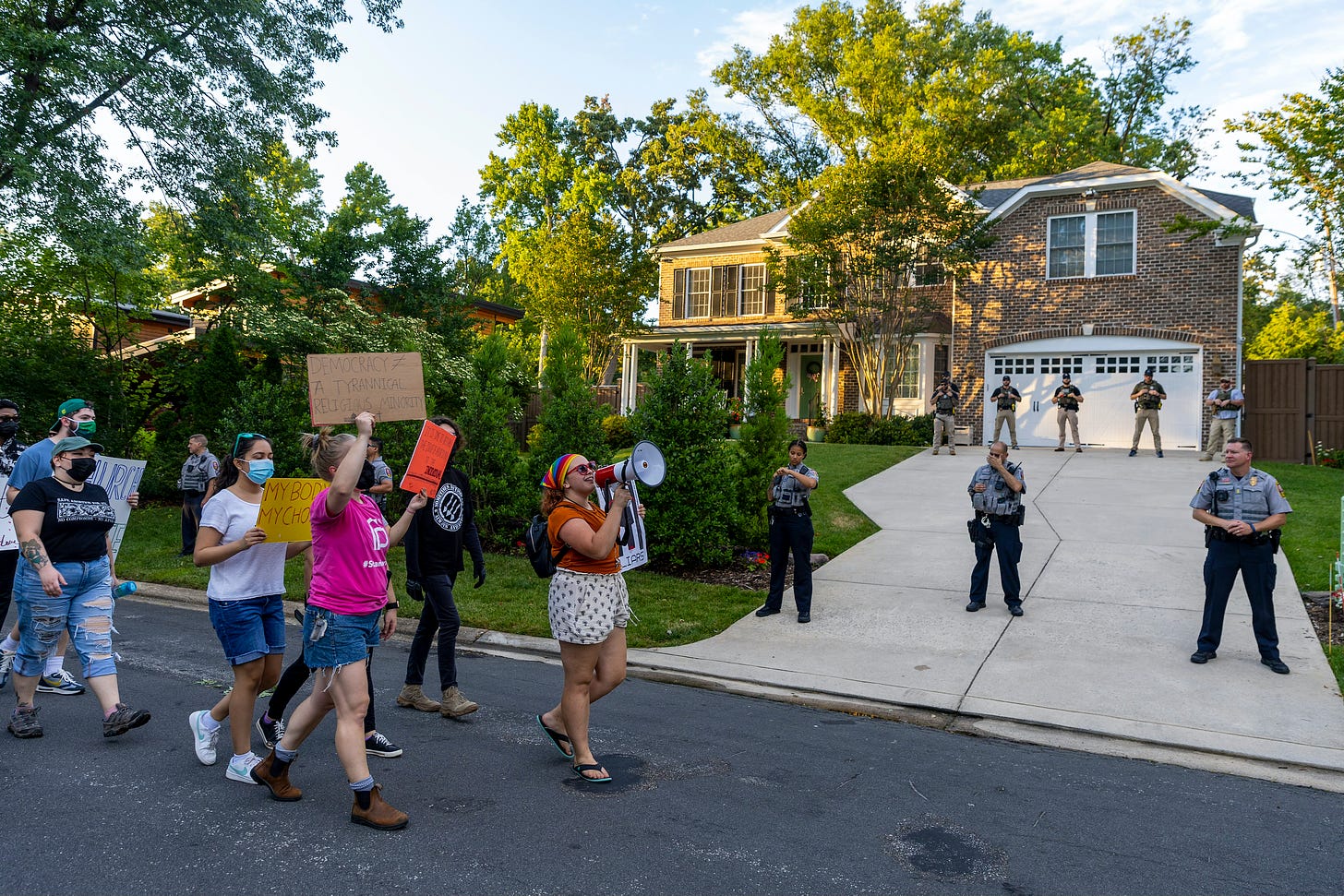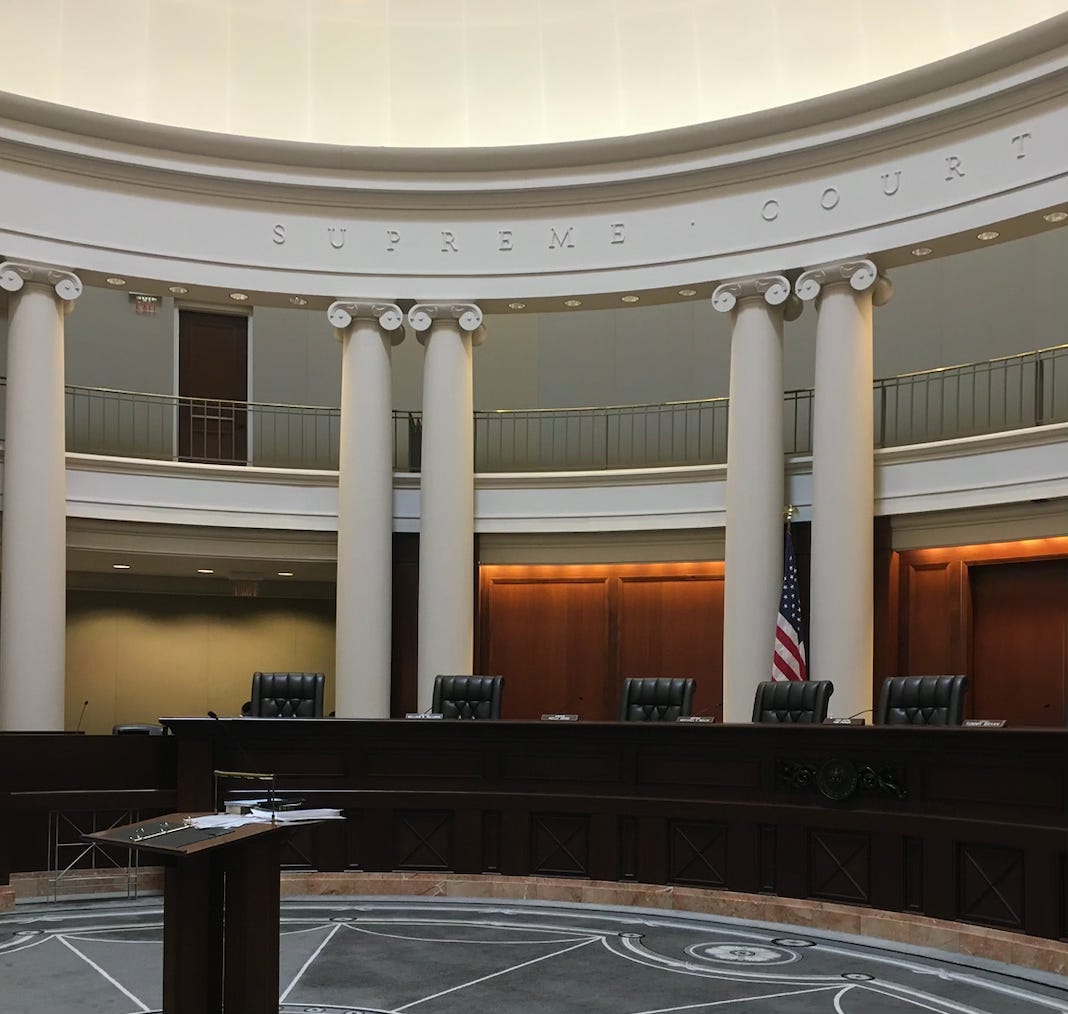Your paid subscriptions to SHERO allow me to continue publishing on many critical issues and provide information to the public, so please consider purchasing one today. If you would like to make a one-time tribute via PayPal, you can click this link now for that option. As always, thank you for taking the time to read and support my work here at SHERO and for helping to provide independent journalism for everyone. I appreciate you.

The United States Supreme Court determined in 1973, that a fetus is not legally considered to be a person before “viability,” which is the time around 24 weeks of gestation when a fetus can survive outside the womb. Justice Harry Blackmun wrote in Roe v. Wade the following: “The word ‘person,’ as used in the Fourteenth Amendment, does not include the unborn.”
Last Friday, the Alabama Supreme Court ruled that frozen embryos are “extrauterine children” under state law, and are therefore entitled to the rights afforded to children. The decision resulted from two wrongful death cases brought by three couples whose frozen embryos were accidentally destroyed by a fertility clinic. The Republican panel of Alabama Supreme Court Justices found that that an 1872 state law allowing parents to sue over the death of a minor child “applies to all unborn children, regardless of their location.”
Alabama Justice Jay Mitchell wrote: “Unborn children are ‘children’…without exception based on developmental stage, physical location, or any other ancillary characteristics.” Mitchell also cited a previous ruling in 2019, where the Alabama Court established that a fetus killed during a woman’s pregnancy was covered under Alabama’s Wrongful Death of a Minor Act and “extrauterine children [are not excluded] from the Act’s coverage.”
When Roe was overturned in Dobbs v. Jackson Women’s Health Organization, nearly 50 years after it was established, the Conservative majority on the United States Supreme Court determined that Roe was “egregiously wrong from the start” because “the Constitution makes no reference to abortion” and “no such right is implicitly protected by any constitutional provision,” including the due process clause of the Fourteenth Amendment. This new tipping power, led by Justice Alito and the three Trump-era justices, was the beginning of a complete conservative overhaul of established Civil Rights law.

In the Dobbs ruling, Justice Clarence Thomas also raised questions about gay marriage and other rights in his concurring opinion, extending the ramifications of the case to many other issues, in addition to abortion bans. This case has directly contributed to the enactment of abortion bans in 24 states, and more than a dozen states have enforced near-total abortion bans since the Supreme Court's June ruling.
This latest ruling in Alabama now threatens the potential impact on fertility treatments and the freezing of embryos, which had previously been considered property by the courts. By extending rights of personhood to not only a fetus but an embryo, Alabama has surpassed the previous limits set by years of precedent, allowing the United States Supreme Court, with its Conservative majority to take up the issue, and possibly reverse more established law.
Since the overturning of Roe in June of 2022, conservative activists have been attempting to extend their agenda to include restrictive abortion bans, limitations on civil liberties and laws that establish extended fetus rights. In the Fall of 2022, the US Supreme Court declined to hear a Rhode Island case brought by two women. who sued on behalf of their fetuses. At the time the high Court made a point to stay away from another issue at the center of America’s burgeoning culture wars, and determined that fetuses lacked the proper legal standing to bring the suit.
However, with this latest Alabama Supreme Court ruling, the United States Supreme Court will not be able to avoid hearing the case on the grounds of standing, and the impact that the newly established law will have on embryo rights will likely force the highest Court in the land to get involved. Given what the Conservative majority has previously said about their new limitations of Roe, it is not a stretch to see how they could easily apply their agenda here, thereby giving a fetus and even an embryo new rights.

Since the Dobbs decision, Republicans at the state level have pursued fetal personhood laws that would grant fetuses a variety of legal rights, and allow for the establishment of abortion bans that limit the procedure — sometimes to six-weeks. Under this new ruling, providers in Alabama may no longer be able to freeze, thaw, transfer or test embryos using best medical practices.
It is also unclear if patients would ever be able to dispose of additional embryos that are created for future possible use, which is a fundamental step in the IVF process. If providers are no longer legally able to freeze embryos, they could also be forced to transfer all immediately created embryos directly into female patients. If a patient becomes pregnant with twins, triplets, or more, the life of the mother may be endangered.

Under this new law, the termination of a pregnancy could be legally considered murder and any kind of miscarriage could have murder or negligent homicide implications. For all of these reasons — which create even more uncertainty with regard to the law as it stands in Alabama moving forward — the Conservative United States Supreme Court is more likely to hear this case to resolve the issue.
Justice Alito and the rest of the Conservative majority declined to weigh in on fetal personhood in Dobbs saying, “Our opinion is not based on any view about if and when prenatal life is entitled to any of the rights enjoyed after birth.” The empty limitation does little to quell the very real worry of many Americans that the Court will have no problem in extending more rights to a fetus in a new case. Given the Court’s willingness to move forward on a political agenda that involves rolling back Civil Rights for many, this Alabama case might be just what the Trump Justices have been looking for.
Amee Vanderpool writes the SHERO Newsletter and hosts the live SHERO podcast on Callin. She is an attorney, published author, contributor to newspapers and magazines, and analyst for BBC radio. She can be reached at avanderpool@gmail.com or follow her on Twitter @girlsreallyrule.
Paid subscriptions and one-time tributes embedded in each article allow me to keep publishing critical and informative work that is sometimes made available to the public — thank you. If you like this piece and want to support independent journalism further, you can forward this article to others, get a paid subscription or gift subscription, or donate once, as much as you like today.






This ruling from AL is so completely boneheaded and dumbass. It defies logic and would be easy to dismiss as ridiculous if it weren’t for real life consequences almost certain to pop up. For people that scream and cry about “freedom” these republicons are doing all they can to limit and take away freedom. From absurd questions like, if frozen embryos are people will they count on the census and can parents sue each other over child support to the serious how will this impact miscarriages and stillborn? Will the state now use its power and resources to investigate women who lose babies to determine if they were at fault? Handmaidens Tale coming to a red state near you. For all of our human achievement republicons prove daily we’re just monkeys with keys. People were warned, if the Supreme Mullahs get rid of Roe the consequences could be beyond absurd as red states work their asses off to disenfranchise women. And here we are. Utter stupidity.
So we make this clear to every single woman reading this article, the state of Alabama is saying that an unborn fetus has more rights than a female who is living in society.
You as a living female are considered chattel to these people. They think of you as property. They think of the fetus as a person.
Please get that through your thick "but it's not affecting me" heads, because it is.